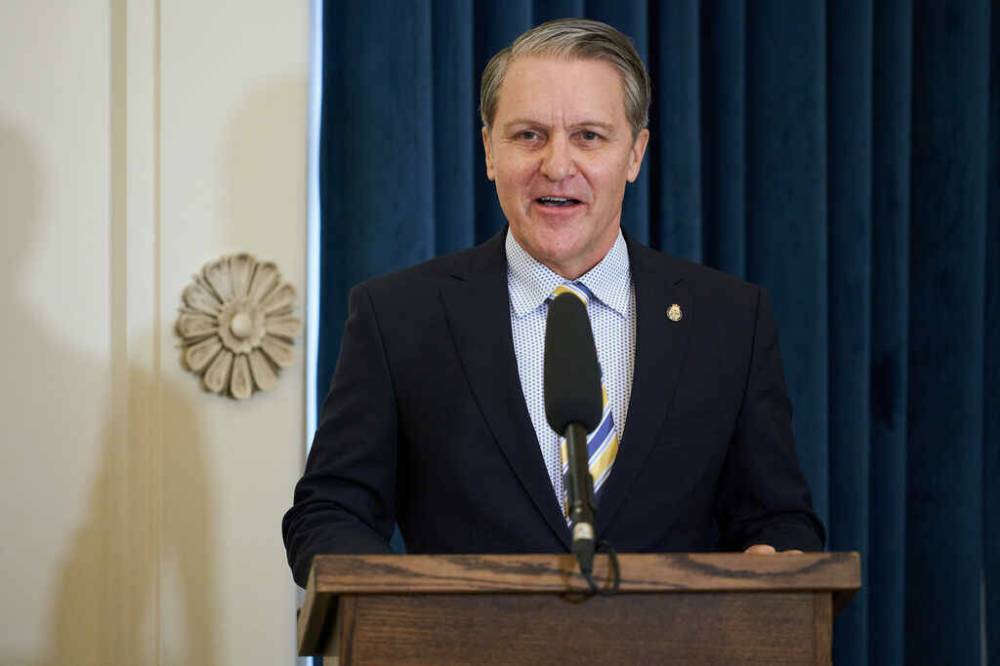Tories bring in modified Hydro bill
Advertisement
Read this article for free:
or
Already have an account? Log in here »
To continue reading, please subscribe:
Monthly Digital Subscription
$1 per week for 24 weeks*
- Enjoy unlimited reading on winnipegfreepress.com
- Read the E-Edition, our digital replica newspaper
- Access News Break, our award-winning app
- Play interactive puzzles
*Billed as $4 plus GST every four weeks. Offer only available to new and qualified returning subscribers. Cancel any time.
Read unlimited articles for free today:
or
Already have an account? Log in here »
Hey there, time traveller!
This article was published 22/03/2022 (1078 days ago), so information in it may no longer be current.
The Progressive Conservatives have introduced legislation that would limit Manitoba Hydro electricity rate increases to five per cent per year after 2025, regardless of inflation.
It also opens the door to the publicly owned utility losing its monopoly on the retail sale of clean, renewable sources of energy.
Bill 36 (The Manitoba Hydro Amendment and Public Utilities Board Amendment Act) is designed to “stabilize” the utility, said Finance Minister Cameron Friesen.

It is similar to legislation shelved by the Tories after former premier Brian Pallister resigned last August. Bill 35 would’ve allowed cabinet to set annual hydro rate increases without oversight by the Public Utilities Board until 2023, with the PUB approving rates in five-year intervals rather than annually from then on.
It was one of five bills killed by the PCs under caretaker premier Kelvin Goertzen,with the explanation that “a new leader has to be able to set their own agenda.”
The new bill would involve hydro rates being set every three years, Friesen told reporters Tuesday. That would save the cost of holding a Public Utilities Board rate application hearing every year — “a very expensive process” for which hydro bears the cost, he said.
Until then, annual electricity rate increases will be capped at the rate of inflation to a maximum five per cent “to provide certainty and assurances to Manitobans,” the finance minister said.
Allowing the retail sale of clean power has nothing to do with privatizing hydro or busting up its monopoly, he said.
“This has to do with the overall evolution that is happening within the energy industry,” said Friesen. “We know that we are moving to a system more and more where consumers are interested to be able to take their own energy needs and capabilities into their own hands.
“With things like solar power, wind generation and smart metering we can already foresee in a few years that residential users will be using power when they need it and perhaps even generating power to draw back into the grid when they don’t,” he said. “This bill does nothing more than to create the capacity. It provides a starting point.”
The lawyer for the Consumers Association of Canada in Manitoba, Manitoba Harvest and the Aboriginal Council of Winnipeg scanned the proposed legislation late Tuesday and identified areas of concern.
It appears to weaken the rate-setting authority of the Public Utilities Board and its oversight of day-to-day capital expenses, customer classes and capital targets, Byron Williams said.
Under the proposed legislation, Williams said the Public Utilities Board would not be able to reduce rates accordingly if it found capital expenditures rubber stamped by the Treasury Board were unreasonable or imprudent.
“The most worrisome element from a consumer perspective is the proposed capital targets, which appear to require Manitoba Hydro to bring in what amounts to close to an additional $5 billion in revenues,” Williams said.
“Now some of that may come through export sales, but to the extent that that comes from rates, that will tend to put significantly above-inflation rate pressures on consumers all the way out to 2040.”
However, Williams said the proposed cap on electricity rates at five per cent or at the rate of inflation (whichever is lower) and the aggressive capital targets contained in the bill require further scrutiny.
“Those capital targets invite (increases) well above the rate of inflation rate. So we’re struggling to understand how they would propose to achieve their capital targets and still keep rate increases to inflation,” Williams said. “That is an important question that our clients will seek to understand.”
Williams said the requirement for the Public Utilities Board to review and provide recommendations on major hydro capital projects would be considered an improvement over the current legislation and a change that is long overdue.
NDP hydro critic Adrien Sala said the PCs are pursuing a less independent PUB and more government control.
“They’re giving themselves the power to directly appoint the head of the PUB,” he said. “This bill also identifies that they will simply be able to allow for the retail reselling of hydro power,” said Sala.”That is a move towards privatization,” he said.
Friesen said his government has no interest in privatizing Manitoba Hydro.
“We’re absolutely committed to keeping Manitoba Hydro robust, strong and in the public interest,” he said.
carol.sanders@freepress.mb.ca

Carol Sanders
Legislature reporter
After 20 years of reporting on the growing diversity of people calling Manitoba home, Carol moved to the legislature bureau in early 2020.

Our newsroom depends on a growing audience of readers to power our journalism. If you are not a paid reader, please consider becoming a subscriber.
Our newsroom depends on its audience of readers to power our journalism. Thank you for your support.


